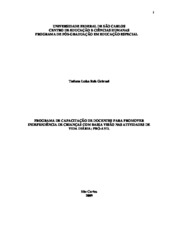Programa de capacitação de docentes para promover independência de crianças com baixa visão nas atividades de vida diária:PRÓ-AVD

Ver/
Fecha
2009-08-25Autor
Gebrael, Tatiana Luísa Reis
Metadatos
Mostrar el registro completo del ítemResumen
It is estimated that in Brazil one of 500 children have low vision. In this population, among all difficult possible, have the dependency in daily life activities (ADL), that influence at social integration, learning and school inclusion. Detached for the regular teacher s work inside the class with ADL´s children especially in preschool. The propose of this work was to develop, implement and evaluate one individual program of collaborative assessoring in Occupational Therapist for teacher training, to increase their repertoire of strategies and resources to promote the independence of preschool children with low vision in activities of daily hygiene and nutrition, called PRÓ-AVD . Study participants were 10 teachers and 10 students with low vision aged between 4 and 6 years of regular education children. The experimental design of the study consisting of 5 teachers and 5 students belonging to the Experimental Group who received the intervention in a first moment, and 5 teachers and 5 students to the control group that received no intervention. The elaborate of the training program involved the study of children's abilities in the tasks of self, and his visual capacity, the original repertoire of the teacher, and the dynamics of dyad Teacher - Student in carrying out AVDs. The implementation happened through collaborative assessoring, on 6 weekly meetings, consecutive, consisting of interactive dynamic between the researcher and teacher. Measures were taken pre-test and post-test and a field diary, analysis of film and questionnaires to assess qualitatively and quantitatively the effect of the intervention program in increasing the repertoire of teachers to promote the independence of their students in AVDs. The program showed efficient when applied, the results were increasing her preparation and teacher repertory to work with hygienic and alimentation activities of the student with low vision. It is believed that the use of methods and teaching approaches, practice activities, feedback and support of researcher presence than weekly meetings were crucial to the membership and participation of teachers, as well as to obtain the results.